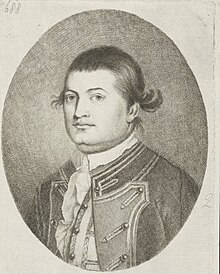Major Francis Grose
| Francis Grose | |
|---|---|

Grose as a captain
|
|
| Born | 1758 Greenland, Middlesex, England |
| Died | 8 May 1814 Croydon, Surrey, England |
| Allegiance |
|
| Service/ |
52nd Regiment of Foot 85th Regiment of Foot New South Wales Corps |
| Rank | Lieutenant General |
| Other work | Lieutenant Governor of New South Wales |
Lieutenant-General Francis Grose (c. 1758 – 8 May 1814) was a British soldier who commanded the New South Wales Corps. As Governor of New South Wales 1792-1794, he established military rule, abolished civil courts, and made generous land-grants to his officers. He failed to stamp out the practice of paying wages in alcoholic spirits, with consequent public drunkenness and corruption. Although he helped to improve living conditions to some degree, he was not viewed as a successful administrator.
Grose was born in Greenland, Middlesex, England around 1758. He was the eldest son of Francis Grose (the well-known English antiquary) and Catherine Jordan. Grose received a commission as an ensign in 1775, in the 52nd Foot and was promoted to lieutenant later that year. Grose served during the American Revolutionary War, where he was twice wounded (at the assaults on Fort Montgomery and Monmouth Court House). Returning to England in 1779 as captain of the 85th Regiment of Foot, he acted as recruiting officer. He attained the rank of major in 1783, in the 96th Foot and in November 1789 was placed in command of the New South Wales Corps and appointed lieutenant-governor of New South Wales.
Grose did not leave England until late in 1791, arriving in Sydney on 14 February 1792 on board the convict transport Pitt. The voyage was not an easy one as fever killed a large number of people on board, seaman, soldiers, convicts, wives, and children.
Grose became colonial administrator when Governor Arthur Phillip, whose health had been poor for some time (probably due to poor diet), received permission to depart. The European population of New South Wales when Grose took over was 4,221, of whom 3,099 were convicts.
...
Wikipedia
